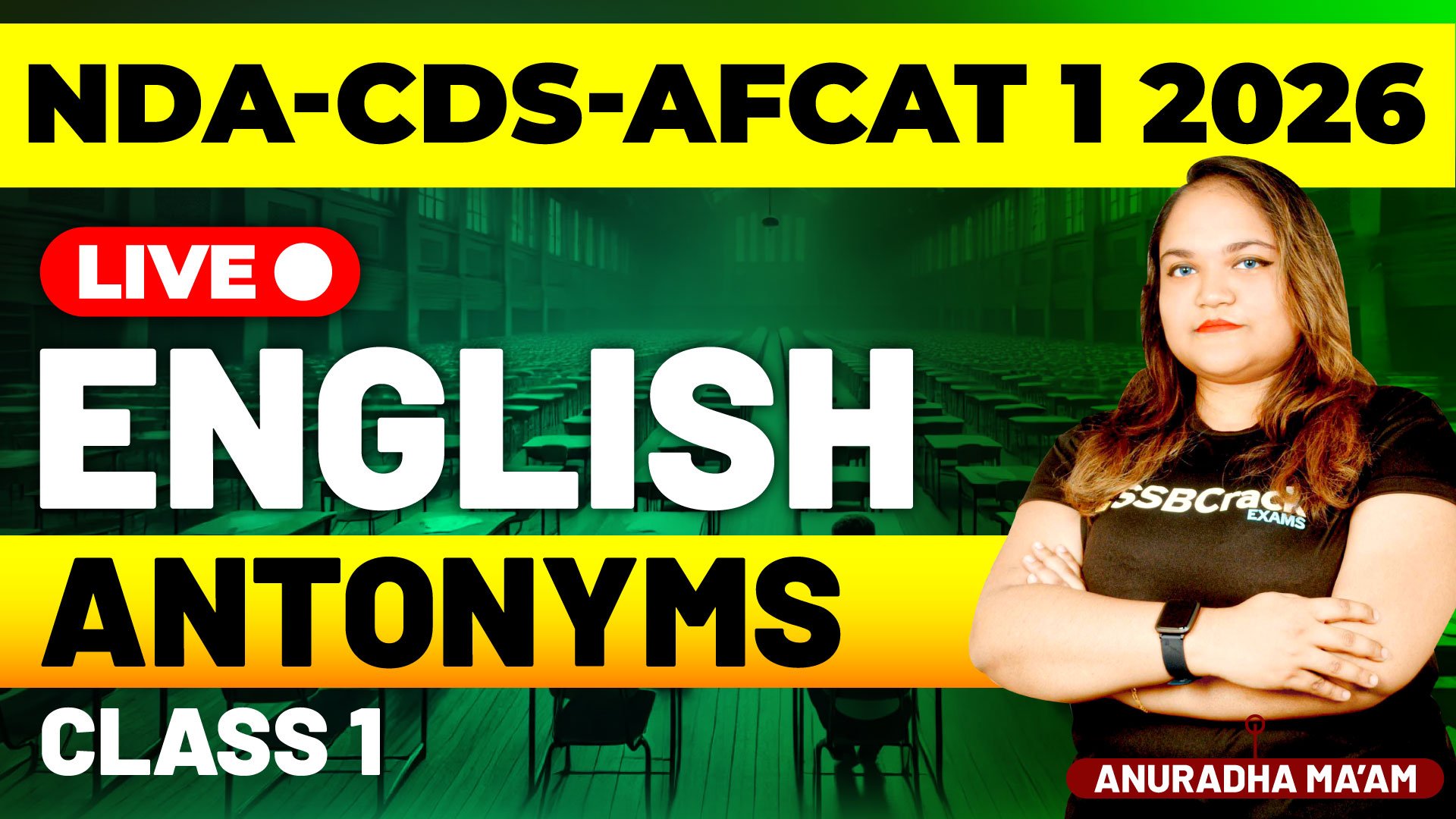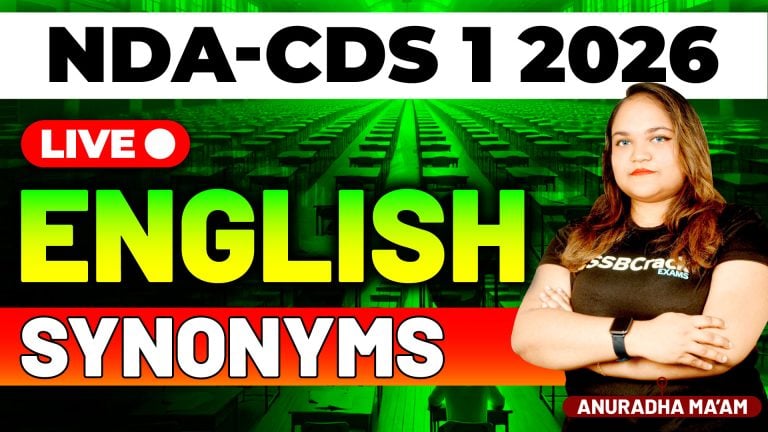The English Live Class 1 on Antonyms marked the beginning of the vocabulary series for NDA, CDS & AFCAT 1 2026 preparation. This session focused on building a strong foundation in understanding opposite meanings of words, enhancing vocabulary, and improving word sense — crucial for scoring high in the English section of Defence exams.
Antonyms are not just about memorizing opposites; they test a candidate’s ability to grasp contextual meaning and choose the word that best conveys the opposite idea. In competitive exams like NDA, CDS, and AFCAT, these questions help assess a candidate’s language precision, comprehension skills, and analytical thinking — all key Officer-Like Qualities (OLQs).
Importance of the Antonyms Topic in Defence Exams
- Frequently Asked in Exams:
Almost every NDA, CDS, and AFCAT English paper includes 2–4 questions based on antonyms. These are easy and scoring if you have practiced well. - Improves Comprehension & Usage:
Understanding antonyms helps candidates grasp meanings faster, especially in Reading Comprehension and Cloze Test passages. - Builds Contextual Awareness:
Antonym-based practice develops your ability to understand tone, attitude, and nuance in language — essential for sentence interpretation and spotting errors. - Enhances Word Power:
A strong grasp of antonyms widens vocabulary, allowing aspirants to express contrasting ideas more effectively in writing and speaking. - Boosts Accuracy & Speed:
Antonym questions are direct and fact-based, helping aspirants secure quick marks with minimum time investment during the exam.
Key MCQs Discussed in Class
The live class focused on exam-oriented multiple-choice questions inspired by previous years’ NDA, CDS, and AFCAT papers. Each question was analyzed in detail — explaining meanings, opposites, and contextual usage.
Here are some of the important MCQs covered in class:
- Expand – (a) Contract (b) Enlarge (c) Extend (d) Grow
✅ Correct Answer: Contract - Artificial – (a) Natural (b) False (c) Genuine (d) Imitation
✅ Correct Answer: Natural - Generous – (a) Selfish (b) Kind (c) Noble (d) Charitable
✅ Correct Answer: Selfish - Hostile – (a) Friendly (b) Angry (c) Rude (d) Harsh
✅ Correct Answer: Friendly - Deficient – (a) Abundant (b) Scarce (c) Lacking (d) Short
✅ Correct Answer: Abundant - Optimistic – (a) Hopeful (b) Cheerful (c) Pessimistic (d) Positive
✅ Correct Answer: Pessimistic - Permanent – (a) Durable (b) Temporary (c) Fixed (d) Lasting
✅ Correct Answer: Temporary
Each word was discussed with its meaning, origin, examples, and related word pairs, helping students understand why one option is correct and others are not.
Class Highlights
- Concept Reinforcement: Focused on understanding word meanings before finding opposites.
- MCQ Drills: Practice through real exam-style questions to strengthen application.
- Synonym–Antonym Comparison: Learnt how both complement vocabulary development.
- Interactive Learning: Rapid revision rounds and elimination-based exercises for better retention.
Learning Strategies Taught in Class
- Word Family Approach:
Learn related words together. Example: hopeful ↔ pessimistic, cheerful ↔ gloomy, honest ↔ deceitful. - Context Clues:
Always read the question word in a sentence to identify the exact sense used before choosing its opposite. - Root & Prefix Analysis:
Example: dis- (as in disagree) or un- (as in unfair) often changes meaning to its opposite. - Regular Reading Practice:
Reading editorials and Defence-related articles exposes aspirants to words in context, naturally strengthening antonym recognition.
Exam Perspective
In the NDA & CDS exams, antonyms are usually direct vocabulary-based MCQs where one must select the correct opposite from four close options.
In AFCAT, questions often appear in contextual form, where understanding the meaning of the entire sentence is key.
Hence, consistent practice with previous year papers and mock tests can help aspirants develop both accuracy and contextual judgment.
Key Takeaways from the Class
- Focus on daily vocabulary building through reading and flashcards.
- Create personal antonym lists and revise them regularly.
- Learn through association and contrast rather than rote memorization.
- Practice 10–15 antonym MCQs daily for steady improvement.
Conclusion
The English Live Class 1 on Antonyms provided aspirants with an effective mix of concept clarity, MCQ practice, and exam strategy.
Antonyms not only strengthen vocabulary but also sharpen one’s ability to think critically and communicate precisely — vital skills for every future officer.
Consistent practice in this topic helps you develop linguistic accuracy, confidence in comprehension, and a sharper mind for analytical thinking — all essential to excel in the NDA, CDS & AFCAT English papers and beyond.
With daily effort and regular revision, mastering antonyms becomes a stepping stone to success — bringing you one step closer to your dream of wearing the uniform with pride.







